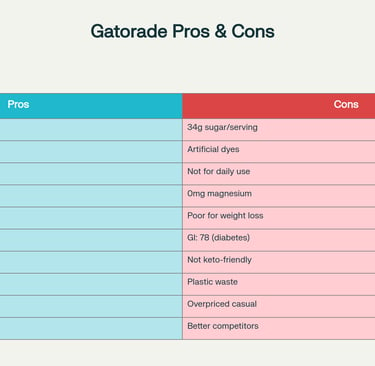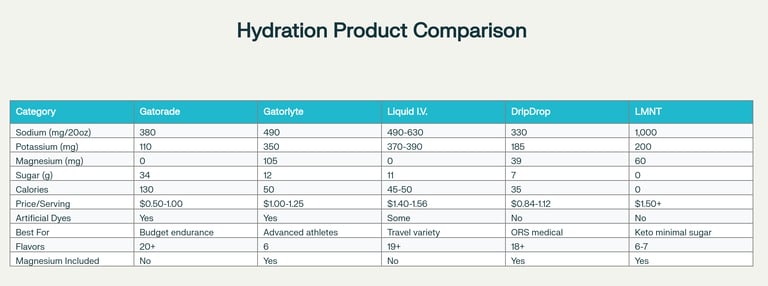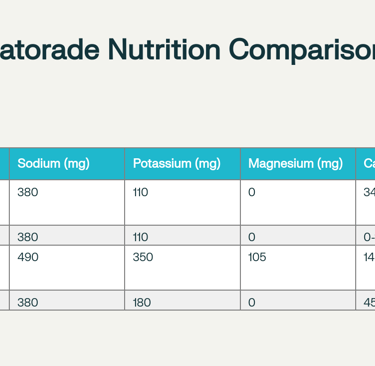Gatorade Review: Is America's Favorite Sports Drink Still the Best for Hydration?
Gatorade review: America's sports drink analyzed for endurance performance, sugar content, artificial dyes, and whether newer competitors have dethroned it.
HYDRATION GUIDE
For sixty years, Gatorade has been synonymous with athletic hydration in America. Born in a University of Florida laboratory in 1965, this orange-hued beverage has dominated sports sidelines, gym coolers, and American refrigerators so completely that many people use "Gatorade" as a generic term for all sports drinks. Yet in an increasingly crowded market featuring advanced formulations like DripDrop's ORS technology, LMNT's high-electrolyte approach, and Liquid I.V.'s cellular transport focus, the question has become urgent: Is Gatorade still the best choice for hydration, or has it been overtaken by newer competitors? With 36 grams of sugar per bottle and artificial dyes facing growing scrutiny, the answer is more nuanced than ever. This comprehensive review examines Gatorade's legacy, its modern product lineup, scientific performance, and whether this American icon still deserves its throne.
Brand Background: From Gator Country to Global Dominance
The Origin Story That Changed Sports Forever
In 1965, the University of Florida football team faced a recurring problem: players were collapsing from dehydration in the sweltering Florida heat, and their performance suffered dramatically in the fourth quarter. Head Coach Ray Graves approached Dr. Robert Cade and his research team with a critical request: create something to keep players hydrated through intense games.
The First Batch Was Terrible: According to Dr. Cade's own account, the initial laboratory concoction tasted so terrible that none of the scientists could stomach it. It took his wife's suggestion of adding lemon juice to create the first palatable version.
The Proof Was in the Performance: The University of Florida freshmen team tested Gatorade in early September 1965 against LSU in 102-degree heat. After trailing 13-0 at halftime, the Gators returned from the break having consumed Gatorade and went on to win the game. That victory spawned the legend.
Expansion and Market Dominance
Key Timeline:
1965: First tested in a college football game
1967: Stokely-Van Camp began nationwide marketing
1973: Legal battles resolved; original inventors created the Gatorade Trust and continued receiving royalties
1983: Quaker Oats Company purchased Stokely-Van Camp, catapulting Gatorade into superstardom with massive marketing budgets
2001: PepsiCo acquired Gatorade through the Quaker Oats acquisition
By 2015: Gatorade controlled 75%+ of the American sports drink market
Modern Market Position
Despite new competitors entering the space, Gatorade remains the #1 sports drink brand in America by market share, with presence in virtually every grocery store, convenience store, gym, and vending machine across the nation. PepsiCo's backing ensures unmatched distribution and marketing resources that competitors struggle to match.
Complete Product Line Breakdown
Gatorade Thirst Quencher (Original Formula)
The classic formula that created the category, available in 20+ flavors including Lemon Lime, Orange, Fruit Punch, Glacier Freeze, and Cool Blue.
Standard Nutrition (per 20oz bottle):
Calories: 130
Sugar: 34g (USDA limit: 25-36g/day)
Sodium: 380mg
Potassium: 110mg
Carbohydrates: 34g
Why It Works for Athletes: 6% carbohydrate solution matches the optimal glucose concentration for athletic performance. Electrolyte formulation matches sweat loss composition for sustained activity >90 minutes.
Gatorade Zero (Zero Sugar)
Launched to address health-conscious consumers, this formula replaces sugar with sucralose and acesulfame potassium while maintaining electrolyte levels.
Nutrition (per 20oz bottle):
Calories: 0-5
Sugar: 0g
Sodium: 380mg
Potassium: 110mg
Artificial sweeteners: Sucralose, Acesulfame Potassium
Critical Concern: Contains the same artificial dyes (Red 40, Yellow 5, Blue 1) as the original formula, linked to hyperactivity in children and potential health concerns.
Gatorlyte (New Rapid Rehydration Formula)
Gatorade's answer to premium competitors like DripDrop and LMNT, featuring a specialized blend of 5 electrolytes with significantly lower sugar.
Nutrition (per 20oz bottle):
Calories: 50
Sugar: 12g (60% less than original)
Sodium: 490mg
Potassium: 350mg
Magnesium: 105mg
Calcium: 120mg
Chloride: 1,040mg
Innovation: Includes magnesium (missing from original formula), mimics advanced ORS technology at lower cost than premium competitors.
Gatorade Fit (For Weight Loss)
Designed for gym-goers focused on body composition, combining hydration with added fiber and reduced calories.
Gatorade Protein Shakes
Post-workout recovery drinks combining hydration with 20-30g protein, carbohydrates, and amino acids.
Gatorade Endurance
Specifically formulated for ultra-endurance events lasting 2+ hours, with higher carbohydrate concentration (8% glucose) and additional electrolytes.
Complete Nutrition Comparison Table
The Science: Does Gatorade Actually Enhance Performance?
Carbohydrate-Electrolyte Synergy
The original scientific basis for Gatorade remains valid: during intense exercise lasting longer than 90 minutes, your muscles deplete glycogen (stored carbohydrates) at alarming rates while simultaneously losing both water and electrolytes through sweat.
A landmark study published in 1997 demonstrated that runners consuming a 6-8% carbohydrate-electrolyte solution performed significantly better in the final 1.6km of a 15km run compared to water alone.
The Mechanism:
Sodium enables rapid water absorption through active transport
Glucose provides immediate fuel for working muscles
The combined effect accelerates rehydration compared to plain water
Carbohydrates sustain blood glucose during extended exertion
Gatorade vs Water: When Water Alone Isn't Enough
Water is Sufficient For:
Exercise lasting <60 minutes
Casual gym workouts
Low-intensity activities
Non-athletes maintaining daily hydration
Gatorade (or equivalent sports drink) is Beneficial For:
Athletes exercising >90 minutes continuously
High-temperature environments requiring heavy sweating
High-intensity interval training
Endurance sports (running, cycling, swimming)
Heavy sweaters losing significant electrolytes
Sugar: Helpful or Harmful?
The 34g sugar in original Gatorade represents a careful balance:
During exercise: Carbohydrates are burned quickly and support performance
At rest: The same sugar amount exceeds recommended daily limits for women and approaches limits for men
Research shows:
Serious athletes exercising >90 minutes: Sugar-containing sports drinks improve performance
Casual gym-goers: Plain water is sufficient; added sugar contributes to unnecessary calories
Sedentary individuals: Daily consumption increases obesity and type 2 diabetes risk
Taste and Flavor Evaluation
Flavor Lineup Assessment
Best-Rated Flavors (Based on Consumer Reviews):
Lemon Lime - Classic, familiar taste, no artificial aftertaste
Fruit Punch - Sweet, accessible flavor profile
Orange - Balanced citrus, refreshing during workouts
Glacier Freeze - Cool blue color, strong appeal to younger athletes
Gatorlyte Lemon Lime - Cleaner taste without excessive sweetness
Divisive/Least Popular:
Cool Blue - Some describe as artificial-tasting
Grape - Overly sweet, medicinal undertones
Tropical/Exotic flavors - Divisive reception, not mainstream
Mixability and Convenience
Powder vs Bottle Trade-offs:
Ready-to-drink bottles: Zero prep needed, convenient for gym bags, expensive per serving ($0.65-1.00/bottle)
Powder packets: Requires water mixing, less convenient, cheaper per serving ($0.30-0.50/serving)
General Assessment:
Easy to drink without artificial aftertaste
Pleasant sweetness level (not overly cloying compared to some competitors)
Clean finish without lingering flavors
Some artificial color perception reported by sensitive tasters
Performance Review: Real-World Effectiveness
For High-Performance Athletes
Professional athletes and serious endurance performers report measurable performance improvements with Gatorade for events >90 minutes, including faster finish times, reduced cramping, and better maintenance of power output in final stages of competition.
Proven Benefits:
Sustained energy during extended exertion
Reduced risk of cramping due to sodium replacement
Improved perceived recovery compared to water
Trusted by elite athletes for decades
For Casual Gym-Goers
For typical 45–60-minute strength training sessions, plain water is equally effective, and Gatorade provides unnecessary calories and sugar.
Expert Recommendation: Save sports drinks for workouts exceeding 60-90 minutes or high-intensity sessions requiring sustained energy.
For Kids and Teens
The American Academy of Pediatrics recommends limiting sports drinks for children due to sugar content and artificial dyes, even for athletic youth.
Primary Concerns:
34g sugar exceeds children's daily recommended limits
Artificial dyes (Red 40, Yellow 5, Blue 1) potentially linked to hyperactivity
Daily consumption contributes to childhood obesity epidemic
Tooth decay risk from sugar and acid
For Heat Dehydration
Gatorade excels in hot-weather conditions where significant electrolyte loss occurs:
Construction workers in summer heat
Outdoor laborers
Athletes in tropical climates
High-sweat-rate individuals
Health Considerations: Sugar, Dyes, and Suitability
Sugar Content Concerns
The Reality:
One 20oz bottle contains 34g sugar
American Heart Association recommends: 25g/day (women), 36g/day (men)
One bottle provides 94-136% of daily recommended sugar for entire day
Regular consumption increases obesity, type 2 diabetes, and cardiovascular disease risk
Glycemic Index: At 78, Gatorade is classified as "high glycemic" (rapid blood sugar spike), concerning for diabetics and those at risk for metabolic disease.
Artificial Dyes: The Petroleum-Derived Question
Gatorade contains petroleum-derived artificial dyes with documented health concerns:
Red No. 40: Linked to inflammatory bowel disease, allergic reactions, potential carcinogenic properties
Yellow No. 5: Associated with hyperactivity in children, allergic reactions, benzidine carcinogen contamination
Blue No. 1: May inhibit nerve cell development, potential carcinogenic and cytotoxic effects
The Controversy: While regulatory agencies (FDA, EFSA) permit these dyes in America, many European countries have banned or restricted them, citing insufficient safety evidence.
Keto-Friendly Assessment
Original Formula: NOT keto-friendly (34g sugar, 34g carbs)
Gatorade Zero: Potentially acceptable for keto but controversial due to artificial sweeteners (sucralose reduces insulin sensitivity) and artificial dyes. Some keto advocates recommend avoiding entirely.
Diabetic Suitability
Original Formula: NOT suitable (high sugar, high glycemic index)
Gatorade Zero: Better option but requires medical consultation due to potential artificial sweetener effects on blood glucose regulation.
Weight Loss Compatibility
Original Formula: Not recommended for weight loss-focused individuals (130 calories, 34g sugar per serving)
Gatorade Zero: Better but not ideal (artificial sweeteners may interfere with satiety signaling and metabolism)
Gatorlyte: Improved option with 50 calories, 12g sugar, and advanced electrolytes.
Comprehensive Comparison: Gatorade vs Modern Competitors
Pros and Cons
Pricing and Availability
Price Breakdown by Retailer
Walmart (Most Competitive):
20oz individual bottles: $2.48-3.00 ($0.62-0.75/bottle)
8-count packs (20oz): $7.98-9.98 ($1.00-1.25/bottle)
12-count packs (12oz): $6.98-7.98 ($0.58-0.66/bottle)
Bulk savings: Larger cases offer 15-20% discounts
Target and Costco: Similar pricing to Walmart with occasional promotions
Amazon: Competitive pricing with Prime shipping, sometimes higher due to delivery premiums
Convenience Stores: Premium pricing ($3.50-4.50/bottle)
Cost Per Serving
Ready-to-Drink Bottles: $0.62-1.25 per 20oz serving
Powder Packets: $0.30-0.50 per serving (requires water, less convenient)
Annual Cost Estimates (One bottle/day):
Budget shopping (Walmart): $225-410/year
Average retail: $400-600/year
Convenience store premium: $1,000-1,600/year
Who Should and Shouldn't Use Gatorade
Ideal Candidates for Gatorade
Buy Gatorade If You:
Train endurance sports (running, cycling, triathlons) for 90+ minutes
Play intense team sports (football, basketball, soccer)
Work in hot environments with significant sweating
Are a high-sweat-rate individual
Need budget-friendly sports hydration
Prefer familiar, well-researched formula
Train at high intensity requiring rapid energy replenishment
Have access to retail locations (ubiquitous availability)
Skip Gatorade If You:
Choose Alternatives If You:
Exercise casually for <60 minutes (water sufficient)
Follow weight-loss-focused fitness
Have type 2 diabetes or prediabetes
Follow keto or low-carb diets
Are concerned about artificial dyes and sugar
Avoid artificial sweeteners (Zero formula)
Prefer premium electrolyte formulations (Gatorlyte, DripDrop)
Have children (minimize sugar and dyes)
Seek zero-calorie hydration (LMNT better choice)
Want magnesium-inclusive formulas
Frequently Asked Questions
1. Can you drink Gatorade every day?
The manufacturer doesn't restrict daily consumption, but nutrition experts strongly recommend against it for non-athletes due to 34g daily sugar far exceeding safe limits. For casual gym-goers, plain water is sufficient for daily hydration. Reserve Gatorade for intense/prolonged workouts.
2. Is Gatorade good for dehydration from illness?
Yes, particularly for dehydration from vomiting, diarrhea, or heat-related illness. The electrolyte-carb combination helps restore fluids and prevent severe dehydration. However, plain water with electrolyte supplements may be preferable for those seeking to minimize sugar intake during recovery.
3. Is Gatorade Zero healthier than original?
Gatorade Zero eliminates sugar (positive) but retains artificial dyes and introduces artificial sweeteners (concerns for some), making it a mixed improvement. For weight loss, Gatorlyte (12g sugar, 50 calories) represents a better middle ground.
4. Does Gatorade help hangovers?
Gatorade helps with hydration and electrolyte replenishment but cannot accelerate alcohol metabolism or reduce inflammation. It aids mild-to-moderate hangover symptoms (headache, dry mouth) but is less effective than professional IV hangover therapy. Best results when consumed immediately after drinking.
5. Is Gatorade safe for children?
The American Academy of Pediatrics recommends limiting sports drinks for kids due to sugar content (contributes to obesity) and artificial dyes (potential behavioral effects). Only appropriate for children engaged in intense athletic activity lasting >1 hour.
6. What's the best time to drink Gatorade?
Optimal timing: During intense exercise lasting >90 minutes or 30-60 minutes post-workout to accelerate recovery. Consuming during casual gym sessions <60 minutes provides unnecessary calories without performance benefit. Avoid consuming regularly outside athletic contexts.
7. Is there a sugar-free option that tastes good?
Gatorade Zero eliminates sugar but maintains artificial dyes and introduces sucralose sweetener. For cleaner sugar-free options, consider Gatorlyte (12g sugar, 50 cal) or premium alternatives like DripDrop or LMNT (0g sugar). Taste preference is highly individual.
8. How does Gatorade compare to electrolyte powders?
Bottled Gatorade offers convenience (ready-to-drink); powder costs less per serving ($0.30-0.50 vs. $0.62-1.25). Performance is equivalent; choice depends on convenience vs. cost priority. Most athletes find powder preferable for regular use due to savings.
9. Is Gatorade keto-friendly?
Original Gatorade is NOT keto-friendly (34g carbs). Gatorade Zero is potentially acceptable (0g sugar) but controversial due to artificial sweeteners. Most keto athletes prefer LMNT (0 carbs, 0 sugar) or Gatorlyte if staying within electrolyte-only approach.
10. What happened to original Gatorade formula?
The original formula remains unchanged and widely available. Newer variants (Gatorlyte, Zero, Fit, Endurance) were added to address evolving consumer preferences and competitive threats. Original "Thirst Quencher" remains the market leader.
Evidence and Research Foundation
This review incorporates research from peer-reviewed sports science journals including studies from the University of Florida (Gatorade's birthplace) documenting the drink's creation and early performance validation. The 1997 landmark study on carbohydrate-electrolyte beverages published in peer-reviewed journals provides scientific basis for performance claims. Nutrition research from Harvard School of Public Health and Cleveland Clinic informs sugar content concerns. FDA safety assessments and consumer reports on artificial dyes provide evidence-based health considerations.
Final Verdict: Is Gatorade Worth Buying Today?
For Serious Athletes
Gatorade remains a legitimate choice for athletes engaging in high-intensity, prolonged exercise (90+ minutes). The 60-year track record, proven science, and universal availability make it reliable. However, Gatorlyte (newer formula) or premium competitors offer superior nutrition profiles for equivalent or lower cost.
For Casual Gym-Goers
Gatorade is unnecessary and suboptimal. Plain water provides complete hydration for typical 45–60-minute workouts. If you desire sports drink functionality, the added 130 calories and 34g sugar provide minimal performance benefit while increasing health risks.
For Weight Loss Athletes
Avoid original Gatorade entirely. Consider Gatorlyte (50 cal, 12g sugar) if you exercise intensely >90 minutes or choose zero-calorie alternatives like LMNT for high-sweat sessions.
For Parents
Limit children's Gatorade consumption to athletic activity lasting >1 hour. Daily consumption significantly contributes to childhood obesity and potentially behavioral issues from artificial dyes. Plain water or natural electrolyte solutions are superior alternatives.
The Bottom Line
Gatorade earned its throne through genuine science and decades of athlete endorsement. For elite endurance athletes, it remains a legitimate choice. However, for most American consumers, competitors like Gatorlyte (same brand), DripDrop, or LMNT offer superior nutrition without marketing-driven premium pricing.
The rise of premium competitors reveals that Gatorade's original formula—while scientifically sound for its intended purpose—hasn't evolved enough for modern health consciousness. The artificial dyes, excessive sugar, and relatively low magnesium compared to newer formulations make it feel dated despite its storied history.
Buy Gatorade if you're an endurance athlete on a budget. Choose Gatorlyte if you want Gatorade's convenience with modern nutrition. Pick competitors if you prioritize health optimization over brand heritage.
Medical Disclaimer:
Always consult your healthcare provider before starting any supplement regimen, particularly if you have diabetes, hypertension, or other medical conditions affecting electrolyte balance.






Connect
Stay updated with our latest diet tips.
Legal
www.thedietplanner.com © 2025. All rights reserved.
